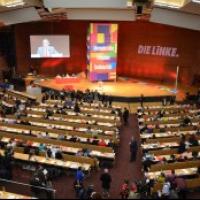
Need to build Left Party on clear anti-capitalist basis
Last weekend saw the convening of a special national party congress of DIE LINKE (Left Party) to decide its manifesto and list of candidates for the European elections on May 25th. The outcome of the congress marks a further step to the right for the party which stands at 8-10% in opinion polls for the euro elections and which is the only party in Germany opposed to bank rescue packages and austerity policies.
The draft election manifesto which was put forward by the National Committee of the party contained the statement that the “EU is neoliberal, largely undemocratic and militaristic”. This statement was challenged by the right wing of the party led by the leader of the parliamentary group in the Bundestag (national parliament) Gregor Gysi. This was no surprise. These forces want to prepare the party for a coalition with the social democrats, the SPD, and the Greens, on a national level after the next parliamentary elections due in 2017. The SPD are now hinting that this may be possible and that this year they may support DIE LINKE taking the post of premier in one of the east German regional states. For a future national deal, a “de-radicalisation” of the Left Party’s foreign policy is a pre-condition. Already before the congress the National Committee, in an act of self-censorship, gave in to this pressure from the right wing and deleted this statement from the draft manifesto before congress delegates could vote on it.
In the meantime, new proposals from forces of the left of the party and of the right wing for a new introduction of the manifesto had been put forward. In a compromise just before the beginning of the congress, these forces came to a deal which meant that 80% of the right wing’s positions were accepted. This was agreed and supported by most of the left wing currents in the party, including the ‘Socialist Left’ and ‘Marx21’ (linked to the British SWP). Only the Anti-capitalist Left (in which members of the German CWI are participating) and one smaller left current did not go along with that and put forward a resolution to include the characterization of the EU as “neoliberal, largely undemocratic and militaristic” in the manifesto. This was not agreed by congress.
The agreed election manifesto does include left reformist demands but it does not come out in a clear opposition to the capitalist EU but rather sees it as a political space which can be reformed in the interest of ordinary working people. It does not call for socialist change in Europe and by this sows illusions into this imperialist and reactionary institution. Gysi and the right wing argued that if the EU did not exist Europe would consist of squabbling states. A vision of a socialist alterative to the EU was not on their agenda – they base their hopes on changing the EU. Unfortunately through this positioning Die LINKE will have problems in reaching out to the broad layers of workers and unemployed who are very critical of the EU and the euro and who see the EU and the European Parliament as bureaucratic monsters serving the interest of big business. This can make it easier for the newly formed right populist ‘Alternative for Germany’ party to use populist slogans to mobilise voters and enter the Euro parliament, something made easier by Germany having in this election a low, 3%, “bar” to winning seats.
The majority of the left wing of the party made this compromise partly because they hoped to be rewarded during the vote for DIE LINKE’s list of candidates. However that did not happen. Three of five left wing candidates who stood for the first nine places on the slate were not elected despite the fact that the national party council had proposed them. But the right wing, mostly based in eastern Germany, had organized beforehand to push through a more ‘moderate’ set of candidates. This will undoubtedly also have consequences for the outlook and policy of the left, GUE/NGL faction in the European Parliament.
Resolution in favour of a socialist Europe
SAV member Lucy Redler was a delegate to the party congress for the Anti-capitalist Left and moved a resolution which called for a clear statement in favour of a socialist Europe. Given the crisis in Europe and the social devastation in the countries of Southern Europe, it is necessary to put forward a programme not only of opposition to all cuts but also in favour of the nationalisation of the banks and corporations, the cancellation of the debt and the break with the capitalist profit-driven economy.
The left currents in the party should draw a balance sheet from the mistaken tactics of going along with far-reaching political compromises and should prepare for the conflicts which will come over the next years concerning the politics and strategy of the party. With a clear and principled position, and active campaigning to build the party, on the ground through class struggle, and on an anti-capitalist basis, it should be possible to strengthen the left wing and prepare the forces for the building of a mass socialist party in Germany.


Be the first to comment